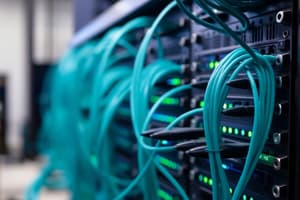Podcast
Questions and Answers
Which of the following is not a web browser?
Which of the following is not a web browser?
- Chrome
- Cable (correct)
- Safari
- Firefox
An IP Address is a way of numerically identifying an entity on a computer network.
An IP Address is a way of numerically identifying an entity on a computer network.
True (A)
What does URL stand for?
What does URL stand for?
Uniform Resource Locator
A website is a set of web pages consisting of text, audio, and video. Web servers host _______.
A website is a set of web pages consisting of text, audio, and video. Web servers host _______.
Match the following: Type of Connection - Description
Match the following: Type of Connection - Description
What was the world's first packet switching network?
What was the world's first packet switching network?
What does an Internet Service Provider (ISP) offer to its customers?
What does an Internet Service Provider (ISP) offer to its customers?
What is the term coined by William Gibson to refer to the computer networks connected to each other and the content they host?
What is the term coined by William Gibson to refer to the computer networks connected to each other and the content they host?
Who created the World Wide Web?
Who created the World Wide Web?
What does a web server host?
What does a web server host?
What is a home page?
What is a home page?
What is a web page?
What is a web page?
What is the purpose of a web browser?
What is the purpose of a web browser?
What is the primary function of a web browser?
What is the primary function of a web browser?
What is the protocol used to request and transmit files over the Internet?
What is the protocol used to request and transmit files over the Internet?
What is the purpose of a URL?
What is the purpose of a URL?
What does the .com domain name typically represent?
What does the .com domain name typically represent?
What is the Internet used for?
What is the Internet used for?
What is the term for a single page on the Internet?
What is the term for a single page on the Internet?
What is the Internet, in simple terms?
What is the Internet, in simple terms?
Which of the following web browsers is developed by Google?
Which of the following web browsers is developed by Google?
Flashcards are hidden until you start studying
Study Notes
What is the Internet?
- The Internet is a means of connecting a computer to any other computer anywhere in the world via dedicated routers and servers.
- It allows computers to send and receive information such as text, graphics, voice, video, and computer programs.
Uses of the Internet
- The Internet is used for many things such as e-mail, social networking, job-hunting, getting the latest news, research, listening to music, watching videos, getting driving directions, and reading online books.
Browser
- A browser is a free software package or mobile app that lets you view web pages, graphics, and most online content.
- Popular web browsers include Chrome, Firefox, Microsoft Edge, and Safari.
Webpage
- A webpage is what you see in your browser when you are on the internet.
- It can contain text, photos, images, diagrams, links, advertisements, and more.
HTTP and URL
- HTTP is the protocol used to request and transmit files over the Internet or other computer networks.
- URL (Uniform Resource Locator) is the web address of internet pages and files, telling the browser exactly where to find the page.
- URLs can have different suffixes such as .com, .net, .mil, .gov, .edu, and .org, which identify the type of organization.
Types of Internet Connections
- There are several types of internet connections to choose from, including:
- DSL (digital subscriber line)
- Cable
- Satellite
- Wireless
- 3G and 4G
Hardware
- The primary piece of hardware needed besides a computer is a modem, which is usually provided by the ISP.
- A router is also needed to connect multiple computers to the same internet connection.
Internet Service Provider (ISP)
- An ISP is a company that provides users with access to the internet.
- ISPs offer email accounts and other services like remote storage of files.
Other Internet-related Terms
- ARPANET: The world's first packet switching network, developed by the United States Department of Defense.
- IP Address: A numerical identifier for an entity on a computer network.
- Cyberspace: A term used to refer to the computer networks connected to each other and the content they host.
- WWW: A collection of interlinked documents that are accessible over the internet.
- Website: A set of web pages consisting of text, audio, and video.
- Web Page: A resource of information that provides navigational abilities through hyperlinks to other web pages.
- Home Page: The default page of a website, often the main page of a complex website.
ARPANET and Internet
- ARPANET (Advanced Research Projects Agency Network) was developed by the US Department of Defense and was the world's first packet switching network.
- The Internet is the successor of ARPANET.
Internet Service Provider (ISP)
- An ISP is a company that provides users with access to the Internet.
- ISPs offer email accounts and other services like remote storage of files.
IP Address
- An IP address is a numerical identifier for an entity on a computer network.
- The original addressing system, IPv4, used 32-bit addresses.
- IPv6 was introduced to accommodate growth, using 128-bit addresses.
Cyberspace
- Cyberspace refers to computer networks and the content they host.
- The term was coined by William Gibson.
World Wide Web (WWW)
- The WWW is a collection of interlinked documents accessible over the Internet.
- It consists of millions of web pages with text, images, voice, and videos.
- Sir Tim Berners-Lee, a British scientist, created the World Wide Web.
Website and Web Page
- A website is a set of web pages with text, audio, and video.
- Web servers host websites.
- A web page is a resource of information created in HTML format with navigational abilities through hyperlinks.
URL
- A URL specifies the location of a resource on the Internet.
- It consists of the basic address and path.
Home Page
- A home page is the default page of a website, often the main page of a complex website.
Web Browser
- A web browser is a software application that facilitates user interaction with web content.
- Popular web browsers include Microsoft's Internet Explorer, Google Chrome, Mozilla's Firefox, and Apple's Safari.
HTTP and URL
- HTTP (Hypertext Transfer Protocol) is the protocol used to request and transmit files over the Internet.
- A URL (Uniform Resource Locator) is the web address of Internet pages and files, telling the browser exactly where to find the page.
Internet Uses
- The Internet is used for various purposes, including e-mail, social networking, job-hunting, getting news, research, listening to music, watching videos, and more.
Studying That Suits You
Use AI to generate personalized quizzes and flashcards to suit your learning preferences.




